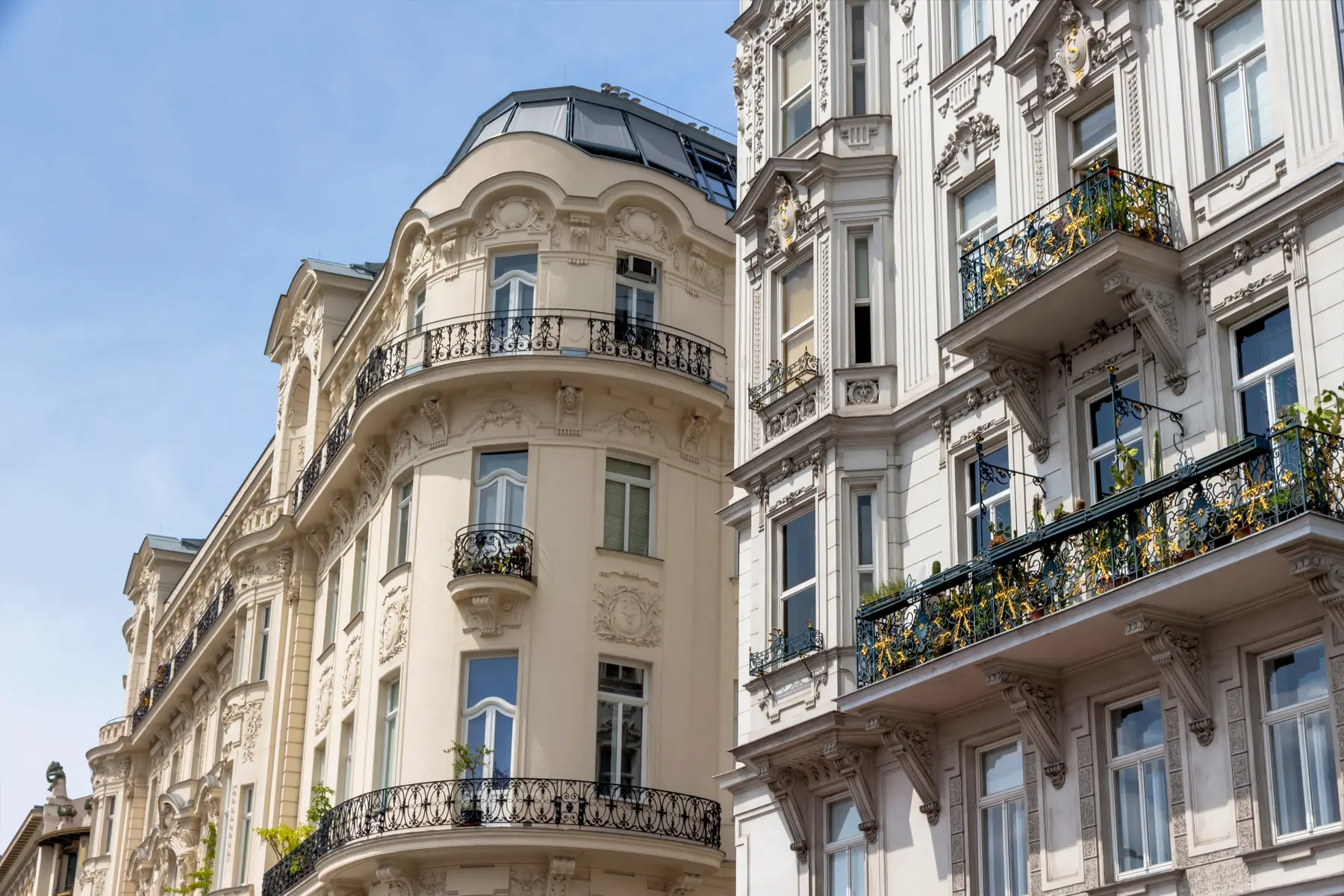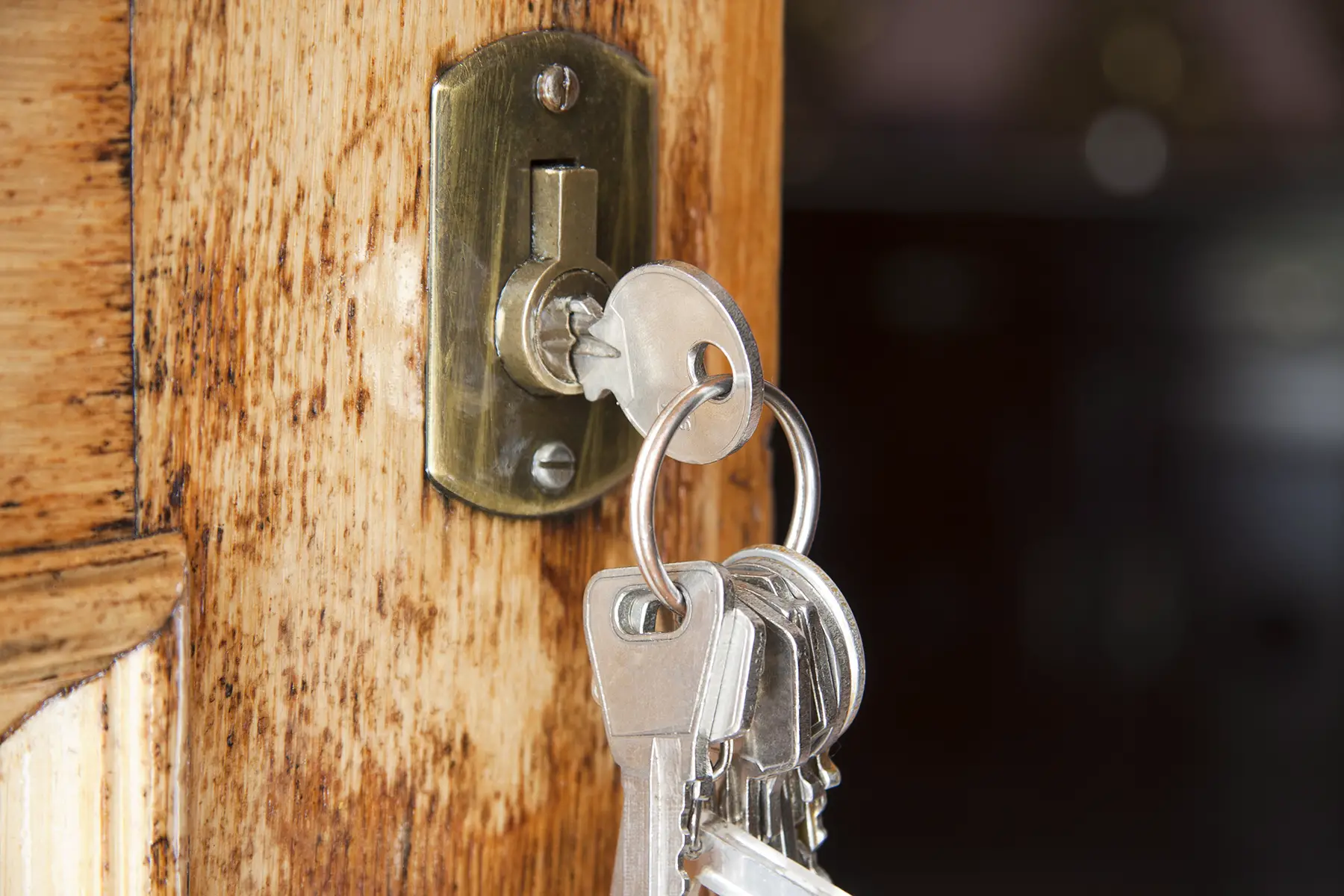Before you start house hunting, it’s important to get familiar with how mortgages work in Austria. The process is relatively straightforward – especially if you’re an EU citizen. If you’re from outside the EU, there may be a few more hoops to jump through, but don’t worry, it’s still very doable with the right preparation. This guide will walk you through the essentials so you know exactly what to expect.
Here’s what you’ll find in this guide to Austrian mortgages:
- Mortgages in Austria
- Can you get a mortgage as a foreigner in Austria?
- Mortgage rates in Austria in 2025
- How much can you borrow for a mortgage in Austria?
- Types of mortgages in Austria
- Austrian mortgages for other purposes
- Green mortgages in Austria
- How to apply for a mortgage in Austria
- Mortgage fees and costs in Austria
- Taxes and tax relief on mortgages in Austria
- Do you need property insurance to get a mortgage in Austria?
- How do mortgage repayments work in Austria?
- Refinancing a mortgage in Austria
- Useful resources
Wise
Buying property abroad is a big step and involves important financial decisions. Wise, an international money transfer company, provides specialist support to help you navigate large international transfers and save on exchange fees. Fill out Wise’s online form today to find out how they can assist you.
Mortgages in Austria
Setting up a mortgage in Austria is a pretty simple process, particularly for expats who are already EU citizens. Expats from outside of the European Union can also apply for a mortgage, however, the process is more complex and lengthy.

Typically, fixed-rate mortgages are popular in Austria and will finance up to 70% of the property for between 15 and 30 years. A 20-year term is typical, but you can get up to a 30-year term if you prefer. Buyers also have the option to suggest the duration to their bank.
Adjustable-rate mortgages are another option, and although they are riskier in the long term, they have a lower initial rate of interest. There are also combination mortgages, which – as the name suggests – combine the two.
Can you get a mortgage as a foreigner in Austria?
Generally speaking, most banks in Austria insist on residency as a condition of approving a mortgage. They also tend to enforce the euro income policy. However, a residency can be secondary. Additionally, it can be a business that is incorporated in Austria. Sometimes, couples decide to apply for a mortgage when one is a resident in Austria while the other keeps another citizenship.
Significantly, foreigners are eligible for a loan in Austria. If you are an EU citizen, things tend to be simple. However, other foreigners face bigger challenges. In recent years, there has been lobbying from banks to make it easier for overseas buyers to use different currencies to get a mortgage.
Fortunately, Austria taxes real estate at 0.1%, the joint third-lowest rate in Europe (excluding Liechtenstein and Malta, which don’t apply a tax) and this applies to all residents. Importantly, citizenship is not a factor when it comes to residency in Austria.
Mortgages in Austria are fairly straightforward to set up. However, if you are not from the EU, you will be a greater risk for the bank. This means that they will ask for further documentary evidence. There are also some regions in Austria where foreigners are not able to purchase property. For more information, you can read our guide to buying real estate in Austria.
To begin with, it’s a good idea to open a bank account with a European bank to make the overall process easier. Then, you should obtain a special permit for property acquisition from the local Land Committee (Grundverkehrskommission). This will indicate whether you intend to use the property for business or residential purposes.
However, if the property will be your permanent home, this isn’t necessary. Finally, you will need to submit your documents to the bank. You can find more information about these documents further down the guide.
Financial requirements for an Austrian mortgage
Mortgage lenders in Austria will look at your income and credit history. Typically, you will need to show that your monthly debt payments (mortgage plus monthly bills) do not exceed 40% of your salary.
However, exact requirements can vary depending on:
- Financial institution
- Austrian state
- Your residence or citizenship status
- Your employment status (e.g. you may face additional requirements if you are self-employed or a freelancer with a fluctuating income)
Mortgage rates in Austria in 2025
Mortgage interest rates in Austria are generally very favorable. Typically, they range from between 2 and 5%. As of April 2025, the mortgage rate according to the Austrian National Bank is 3.42%. This is down from 4.17% in October 2023, but above a low of 1.18% in 2021-22. Essentially, mortgage rates rise up and down according to the financial stability and reliability of the borrowers.
Essentially, mortgage rates rise up and down according to the financial stability and reliability of the borrowers. Other factors include inflation, economic growth, monetary policies, and the over conditions of the housing market.
How much can you borrow for a mortgage in Austria?
Typically, for a fixed-rate mortgage in Austria, you can borrow up to 70% of the property. Sometimes, this may increase to up to 80%. The down payment should cover the remainder of the property purchase value.
On average, the down payment will be 40% for a new-build property and 50% for a secondary home. Credit payment periods are generally up to 35 years. Ordinarily, the size of the loan capital in Austria starts at €25,000, but there are no upper limits for the loan size.

If you already own property in Austria, you can use it as security for the loan. For borrowing, your existing monthly outgoings and monthly repayment on your mortgage (combined) should not exceed 40% of your gross monthly income. Any incoming investments and rent can offset this percentage as well.
Austria mortgage calculator
You can use this handy European Mortgage Calculator as a loan calculator in Austria to work out how much you can borrow.
Types of mortgages in Austria
There are three types of mortgage available in Austria, as follows:
Fixed-rate mortgage
This is the most common type of mortgage in Austria and typically covers 15 to 30 years, however, this is flexible depending on the bank you choose.
Adjustable-rate mortgage
This type of mortgage offers a lower initial rate of interest but is riskier in the long run. It is also known as floating-rate mortgages, and the interest rate follows the Euribor (Euro Interbank Offered Rate).
These floating rates are recalculated every three months; therefore, the benefit is that the Euribor could drop, meaning that you can pay back your loan ahead of schedule. On the flip side, however, the Euribor could rise, leading to overpayments for you.
Mortgage combination
This option is simply a mixture of the two types of mortgage detailed above. Essentially, a combination mortgage meshes the two loans together into agreed terms. You can choose what you need from the two mortgages and work out a specifically curated loan that works for you.
For instance, 60% of the loan is paid on a fixed interest during an agreed period, while the other 40% is paid at an adjustable 1.5% + Euribor. This type of mortgage is available for both commercial and residential use and will also apply if you are looking for a loan on a second residence or to renovate your current home.
Austrian mortgages for other purposes
There are other types of mortgages in Austria available through many banks and financial institutions. These are typically available to all residents, although expats may face tougher requirements and have to provide additional documentation.
Additional types of Austrian mortgage include:
- Second mortgages for holiday homes or buy-to-let properties
- Home renovation loans
- Commercial mortgages for business properties
Green mortgages in Austria
Some Austrian banks offer green mortgages schemes in Austria. For example, UniCredit Bank Austria has a green mortgage bonds scheme with proceeds financing sustainable building projects across the country. Erste Bank und Sparkasse also offer loans with preferential terms or interest rates for properties that meet certain green building or energy efficiency standards.

In addition to this, the Austrian government has green retrofit incentive schemes that offer subsidies and other incentives to homeowners who upgrade their heating systems with more energy-efficient alternatives.
How to apply for a mortgage in Austria
In Austria, mortgages are offered by joint-stock banks, state mortgage-issuing institutions, and building societies.
To get a mortgage loan in Austria, you will need to submit the following documents to the bank:
- passport
- signed property sale agreement (or signed offer to purchase)
- proof of salary (for employees) or proof of company income (for business owners)
- savings account statements
- any other property contracts you own
All foreign-language documents must be translated into German and notarized. Companies like lingoking can provide a fast and flexible translation service to assist you with your documents. Remember, applications for mortgages usually take two to three weeks.
Through a bank
- UniCredit Bank Austria – this is the largest and most accessible bank in Austria. This behemoth offers specific expat-focused accounts and may be able to offer you a mortgage.
- Erste Bank – another major player on the financial front in Austria. You can also open an account online.
As an expat, you might be interested in a more familiar bank, such as one of the following that operates in Austria:
Furthermore, The Family Building Society also helps expats to secure mortgages in Austria from the UK.
Mortgage fees and costs in Austria
Fees for your mortgage in Austria are likely to include the following:
- Mortgage lender fees – this includes the mortgage arrangement and property valuation fee, typically between 3–4% of the purchase cost overall
- Land register fee – 1.2% of purchase price
- Lawyer or notary fees – between 1 and 3% of the property costs
Some banks will also charge for an assessment of the property. This will be between 0.5 and 0.8% of the loan amount.
Taxes and tax relief on mortgages in Austria
In Austria, those who buy or own a home benefit from favorable tax treatment. Depending on the size of the home you purchase, you can get tax deductions on your mortgage interest payments for expenses incurred for the construction or regeneration of your property.
Austria has also implemented a taxation regime on the sale of non-business real estate property with grandfathering rules. For instance, on new property, the sale of the property is taxable at a rate of 30%.

Real estate transfer tax is typically a flat rate of 3.5% on property sales in Austria. All Austrian residents are subject to Austrian income tax on their worldwide income, including income from employment, investments, and property. Non-residents, however, are only subject to tax on income from certain sources in Austria.
In addition, there are grants for home-buyers in each municipality. For instance, in Vienna, low-income residents can apply for a housing benefit scheme. If you are not an Austrian citizen, however, you must have lived in Austria for five years to be eligible.
Do you need property insurance to get a mortgage in Austria?
Home insurance is mandatory for real estate in Austria as a condition of your mortgage. This will cover damage to your house or apartment, as well as liability. Generally, Haushaltsversicherung (household insurance) is also a good idea when you purchase a new home.
How do mortgage repayments work in Austria?
In Austria, you can usually repay part or all of your debt early. This allows you to stop paying interest on outstanding debt, or move to a more favorable offer. This applies even if it is from a different lender. That said, depending on the type of mortgage you have and your bank, you may need to pay a penalty.
Since the COVID-19 pandemic, Austria has offered a moratorium on loan repayments. To qualify, you have to prove that you suffered a loss of income due to the exceptional circumstances of the pandemic and cannot reasonably repay your loan.
Refinancing a mortgage in Austria
You can apply to refinance your Austrian mortgage, either though your current lender or by taking out a new mortgage to pay off your existing mortgage. Reasons for doing this could be to take advantage of lower interest rates, adjust your repayment terms, or consolidate existing debt.
Bear in mind that, while refinancing can lead to lower monthly mortgage repayments, you will usually have to pay fees for doing this. Therefor, it is a good idea to shop around for the best deal, and take into account the initial costs compared to long-term gains.
Useful resources
- Oesterreich.gv.at – a government portal with information on a wide variety of topics
- City of Vienna – provides information about the housing benefit scheme including application details







